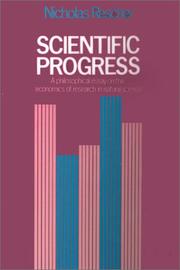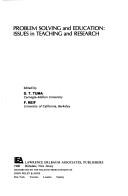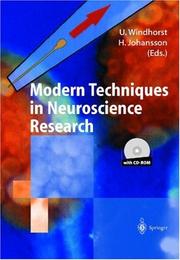| Listing 1 - 10 of 39 | << page >> |
Sort by
|
Periodical
Abstract | Keywords | Export | Availability | Bookmark
 Loading...
Loading...Choose an application
- Reference Manager
- EndNote
- RefWorks (Direct export to RefWorks)
Research --- Social sciences --- Science --- Science research --- Scientific research --- Information services --- Learning and scholarship --- Methodology --- Research teams --- Methodology. --- research methods --- methodology --- social sciences
Periodical
ISSN: 18138152 19962940 Year: 1995 Publisher: Paris, France : Organisation for Co-operation and Economic Development,
Abstract | Keywords | Export | Availability | Bookmark
 Loading...
Loading...Choose an application
- Reference Manager
- EndNote
- RefWorks (Direct export to RefWorks)
Industrial economics --- Research, Industrial --- Recherche industrielle --- Finance --- Finances --- Contract research --- Industrial research --- Research --- Engineering experiment stations --- Inventions --- Technological innovations --- Engineering --- Statistics --- Construction --- Industrial arts --- Technology --- Science --- Science research --- Scientific research --- Information services --- Learning and scholarship --- Methodology --- Research teams
Periodical
Abstract | Keywords | Export | Availability | Bookmark
 Loading...
Loading...Choose an application
- Reference Manager
- EndNote
- RefWorks (Direct export to RefWorks)
Research grants --- Research --- Research --- Research --- Research grants. --- Research --- Science --- Science research --- Scientific research --- Information services --- Learning and scholarship --- Methodology --- Research teams --- Grants --- Grants, Research --- Grants-in-aid --- Scholarships --- Subsidies --- Federal aid to research --- Finance --- Management --- Finance. --- Management. --- Research
Book
ISBN: 9781780680316 1780680317 Year: 2011 Publisher: Cambridge ; Portland, OR : Intersentia,
Abstract | Keywords | Export | Availability | Bookmark
 Loading...
Loading...Choose an application
- Reference Manager
- EndNote
- RefWorks (Direct export to RefWorks)
Law of obligations. Law of contract --- Belgium --- Research --- Consortia --- Law and legislation --- 347.4 <493> --- Verbintenissen. Overeenkomsten. Verbintenissenrecht. Obligaties. Contracten--België --- 347.4 <493> Verbintenissen. Overeenkomsten. Verbintenissenrecht. Obligaties. Contracten--België --- Science --- Science research --- Scientific research --- Information services --- Learning and scholarship --- Methodology --- Research teams --- Consortiums --- Joint ventures --- Research - Law and legislation - Belgium - Congresses --- Consortia - Law and legislation - Belgium - Congresses --- Belgique --- Contrats --- Recherche
Book
Abstract | Keywords | Export | Availability | Bookmark
 Loading...
Loading...Choose an application
- Reference Manager
- EndNote
- RefWorks (Direct export to RefWorks)
Sociology of knowledge --- Philosophy of science --- Science --- Research --- Sciences --- Recherche --- Philosophy --- Methodology --- Social aspects --- Philosophie --- Méthodologie --- Aspect social --- 165 --- -Research --- -Science --- -Natural science --- Science of science --- Science research --- Scientific research --- Information services --- Learning and scholarship --- Research teams --- Kennisleer. Epistemologie --- Methodology. --- Philosophy. --- Social aspects. --- -Kennisleer. Epistemologie --- 165 Kennisleer. Epistemologie --- -165 Kennisleer. Epistemologie --- Natural science --- Méthodologie --- Science and society --- Sociology of science --- Normal science

ISBN: 0631179801 9780631179801 Year: 1978 Publisher: Oxford Blackwell
Abstract | Keywords | Export | Availability | Bookmark
 Loading...
Loading...Choose an application
- Reference Manager
- EndNote
- RefWorks (Direct export to RefWorks)
Sociology of knowledge --- Philosophy of science --- Research --- Recherche --- Economic aspects --- Philosophy --- Aspect économique --- Philosophie --- -Research --- -Science --- Science research --- Scientific research --- Information services --- Learning and scholarship --- Methodology --- Research teams --- Economic aspects. --- Philosophy. --- -Economic aspects --- Aspect économique --- Research - Economic aspects --- Research - Philosophy

Abstract | Keywords | Export | Availability | Bookmark
 Loading...
Loading...Choose an application
- Reference Manager
- EndNote
- RefWorks (Direct export to RefWorks)
Cognitive psychology --- Curriculum planning --- -Problem solving --- -Research --- -Science --- Science research --- Scientific research --- Information services --- Learning and scholarship --- Methodology --- Research teams --- Psychology --- Decision making --- Executive functions (Neuropsychology) --- Curriculum development --- Education --- Instructional systems --- Planning --- Congresses --- Study and teaching --- -Congresses --- Research --- Curricula --- Design --- Problem solving --- Study and teaching&delete&
Periodical
Abstract | Keywords | Export | Availability | Bookmark
 Loading...
Loading...Choose an application
- Reference Manager
- EndNote
- RefWorks (Direct export to RefWorks)
Science --- Research --- Research. --- Science. --- Life Sciences --- General and Others --- climatology --- meteorology --- Natural science --- Science of science --- Sciences --- Scientific research --- Information services --- Learning and scholarship --- Methodology --- Research teams --- Industries --- Meteorology. Climatology --- Meteorology --- Climatology --- Meteorology. --- Climatology. --- Climate --- Climate science --- Climate sciences --- Science of climate --- Atmospheric science --- Aerology --- Natural sciences
Periodical
ISSN: 23677163 Year: 2015 Publisher: Sofia, Bulgaria : PENSOFT Publishers
Abstract | Keywords | Export | Availability | Bookmark
 Loading...
Loading...Choose an application
- Reference Manager
- EndNote
- RefWorks (Direct export to RefWorks)
Research --- Research grants --- Science --- Science. --- Research. --- Research grants. --- Grants --- Grants, Research --- Scientific research --- Natural science --- Science of science --- Sciences --- Industries --- research cycles --- research ideas --- Grants-in-aid --- Scholarships --- Subsidies --- Federal aid to research --- Information services --- Learning and scholarship --- Methodology --- Research teams --- Natural sciences

ISBN: 3540644601 3642636438 3642585523 9783540644606 Year: 1999 Publisher: Berlin Springer
Abstract | Keywords | Export | Availability | Bookmark
 Loading...
Loading...Choose an application
- Reference Manager
- EndNote
- RefWorks (Direct export to RefWorks)
Neuroscience has become a rapidly expanding young science that relies on a number of other sciences and their methods. For that reason it is a truly interdisciplinary and inter-methodological undertaking of much fascination to many. In this spirit, this book attempts at presenting an overview of the techniques currently used in modern neuroscience research. By doing so, it is also an introduction into neuroscience itself, from the angle of methods available to tackle prevailing questions. Many questions can only be answered by combining methods borrowed from different fields. Building on this insight, this book's organizing principle is the investigation of levels of the nervous system, from molecular and cellular to whole organisms. The reasons are twofold. First, certain organizational levels can be optimally studied and potentially understood only by applying an array of diverse techniques. Second, it is important to avoid succumbing to the danger of pure technicality, which might arise from ordering the description of techniques according to their inherent principles of coherence (e.g. staining vs. electrophysiological techniques). In addition, this book aims at providing a direct working tool for the user in the laboratory and clinic and thus addresses all active neuroscience researchers, from graduate students to supervisors. The main emphasis in terms of layout is on detailed step-by-step protocols including personal tips and recommendations. Most chapters or protocols are organized so that they can be used independently. Moreover, cross-references to other techniques in other chapters, which are aimed at studying the same object(s) from a different angle, help create the pertinent context.
Neurosciences --- Biological techniques --- Animal psychology and neurophysiology --- Research. --- TECHNIQUES --- Neurons. --- Neurosciences. --- Neural sciences --- Neurological sciences --- Neuroscience --- Medical sciences --- Nervous system --- Nerve cells --- Neurocytes --- Cells --- Science --- Science research --- Scientific research --- Information services --- Learning and scholarship --- Methodology --- Research teams --- Research --- Monograph --- Animal physiology. --- Animal Physiology. --- Animal physiology --- Animals --- Biology --- Anatomy --- Physiology --- Neurosciences - Laboratory manuals
| Listing 1 - 10 of 39 | << page >> |
Sort by
|

 Search
Search Feedback
Feedback About
About Help
Help News
News